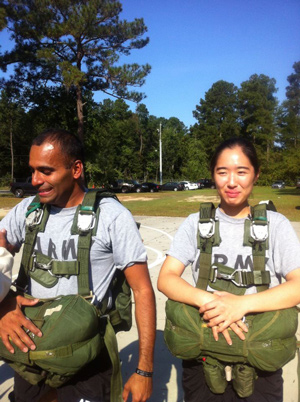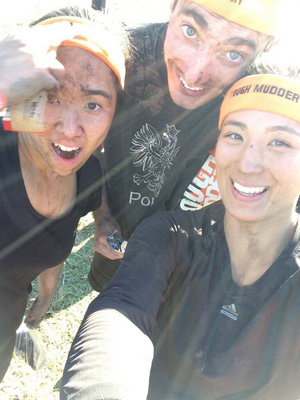Former Army sergeant says confidence is key in transitioning
Former Sgt. Yoonjin Cho says, when it comes to translating the skills you learn in the military into traits corporations are looking for in potential employees, it comes down to confidence.
“One of the biggest fears for a lot of service members is not knowing how to make what they’ve learned in the military applicable to civilian companies,” she says. “Many people lose hope because they lose confidence. But there are a lot of companies that want to hire people with the kind of skills former service members have; all you need to do is believe in yourself and your abilities and demonstrate your value.”
The kind of skills former service members have in abundance, and companies crave, are soft skills — things like leadership, responsibility, grace under pressure. Skills that anyone can develop, but that are taken to a different degree when you’re serving in the military, Cho says.

“Due to the nature of being in the military, we all learn to work under intense pressure,” she says. “A lot of people have to shoulder some sort of responsibility, but it’s different in the military. People’s lives are depending on you. That’s an experience you can’t get from college or day-to-day life.”
And having those military experiences, developing those skills will not only help service members demonstrate their value to potential employers, but also help them cope with the major life changes taking place during their transition.
“The whole experience of transitioning out of the military and working at a corporation for the first time is not an easy process,” Cho says. “But it pales in comparison to what a lot of service members have gone through, such as during a deployment or just in the general military environment.”
Cho says one of the skills she’s relied on heavily since becoming a software engineer for Office 365 at Microsoft is teamwork. “Something I learned in the military was how to work as a team. That’s not something I learned in college. And, here at Microsoft, my manager says our team has come together more as a whole since I’ve been here and that I’ve helped improve how our team works together. I’m really glad that I’ve already been able to make an impact.”
Though Cho already had a degree in computer science before joining the Army, she credits Microsoft Software & Systems Academy (MSSA) with helping her find her post-military career. Unlike most service members approaching their separation date, Cho did not have much time to plan what her next steps would be after leaving the Army. Luckily, she says, she received an email about MSSA. That same day, her supervisor suggested she check out the program.

“I already had a degree in computer science, and my role in the Army as a cryptologist-linguist was very technical, which is what led me to realize how much I loved technology,” Cho says. “So when I heard about MSSA, I thought, ‘perfect.’”
The program serves a significant need, she says. MSSA is an intensive 18-week course that provides active duty U.S. service members with the career skills necessary to meet the IT industry’s high demand for talent. In addition, Microsoft employees mentor participants in areas like resume writing, interviewing and translating their military experiences into corporate language. That mentorship, Cho says, is the most valuable aspect of the program.
“I’ve seen a lot of service members who decided to get out of the Army, for whatever reason, have difficulty finding a job. It’s really hard to apply your skill set to a lot of jobs outside the military,” she says. “At the same time, a lot of companies don’t look at the soft skills those service members have. As far as I know, Microsoft is one of the first companies to provide this sort of education and opportunity to service members. I still talk to service members from my old unit and, according to them, it sounds like more and more companies are following in Microsoft’s footsteps and committing to hire veterans. It’s one great way to show appreciation to people who’ve served our country — and acquire valuable employees.”
